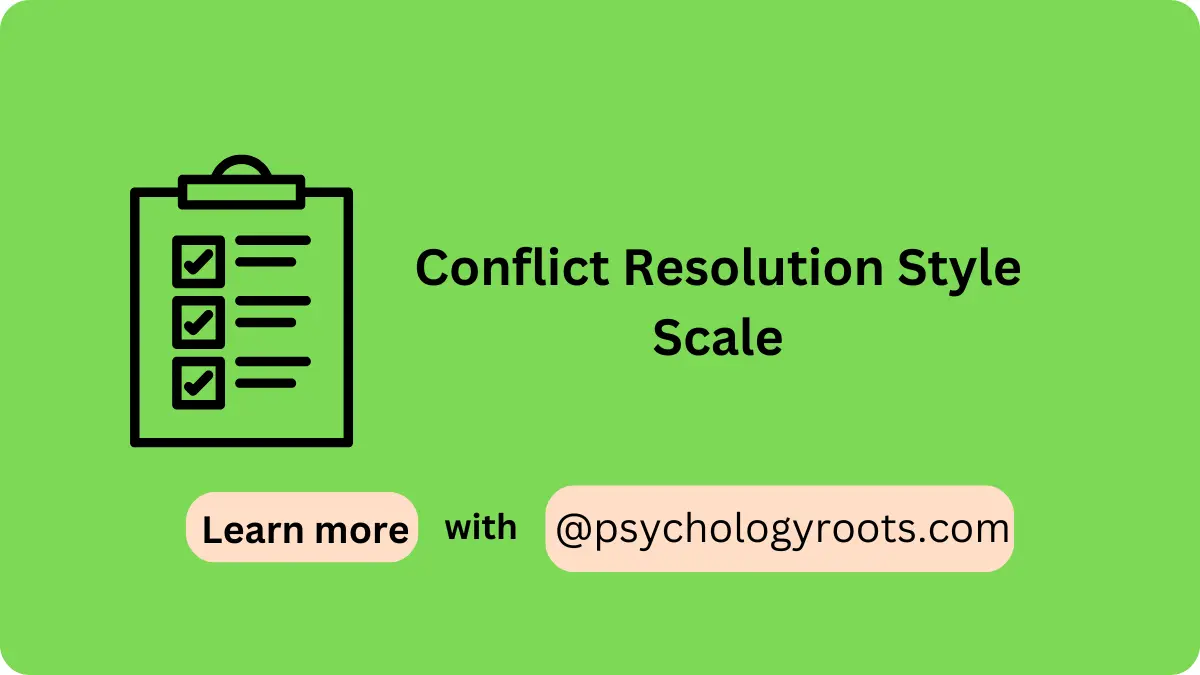Table of Contents
Conflict Resolution Style Scale
Here in this post, we are sharing the “Conflict Resolution Style Scale”. You can read psychometric and Author information. We have thousands of Scales and questionnaires in our collection (See Scales and Questionnaires). You can demand us any scale and questionnaires related to psychology through our community, and we will provide you with a short time. Keep visiting Psychology Roots.
About Conflict Resolution Style Scale
Scale Name
Conflict Resolution Style Scale
Author Details
Ronald G. Slaby and Nancy G. Guerra
Translation Availability
English

Background/Description
The Conflict Resolution Style Scale, developed by Ronald G. Slaby and Nancy G. Guerra in 1988, is a self-report questionnaire designed to measure styles of handling conflict situations among African-American males aged 12-16 in urban settings. Used in violence prevention research, the scale assesses how adolescents respond to interpersonal conflicts, identifying tendencies toward aggressive, avoidant, or prosocial resolution strategies. Grounded in social-cognitive theory, it aligns with research on aggression and conflict management (Huesmann, 1988) and was part of studies exploring psychosocial factors in high-risk youth, as noted in Paschall and Flewelling (1997). The scale’s items loaded on the same factor as hostility measures in some analyses, suggesting overlap with aggressive tendencies.
The scale comprises items (exact number not specified, likely 10-15 based on similar measures) rated on a Likert-type scale (e.g., 1 = “never” to 4 = “always”), assessing conflict resolution approaches (e.g., “I try to talk it out,” “I get angry and fight,” or “I avoid the problem”). Higher scores on specific subscales indicate greater use of corresponding styles (e.g., aggressive or prosocial). Validated in urban African-American male samples, it is used to evaluate conflict management skills and inform interventions.
Psychologists, educators, and public health researchers use the scale to assess conflict resolution tendencies, though its unpublished status and lack of reported psychometric properties limit its reliability. Its cultural specificity is a strength, but its English-only availability and narrow demographic focus restrict broader application.
Administration, Scoring and Interpretation
- Obtain a copy of the scale from authorized sources, such as Paschall and Flewelling (1997) in Ethnicity and Disease or research archives citing Slaby and Guerra (1988), ensuring ethical use permissions.
- Explain the purpose to respondents, noting that it assesses how they handle conflicts to promote positive skills, emphasizing confidentiality and using culturally sensitive, age-appropriate language.
- Provide instructions, asking respondents to rate how often they use described conflict resolution strategies, using the Likert scale.
- Approximate time for completion is 5-7 minutes, depending on the number of items and reading ability.
- Administer in a classroom, community center, or research setting, using paper or digital formats, ensuring a private environment. Oral administration may be used for students with reading difficulties.
Reliability and Validity
Psychometric properties for the Conflict Resolution Style Scale are not detailed in available sources, including Paschall and Flewelling (1997) or Dahlberg et al. (2005). Internal consistency, test-retest reliability, and validity metrics are not reported, likely due to its unpublished status. The scale’s items loading on the same factor as hostility measures suggests potential overlap with aggression constructs, complicating its specificity.
Convergent validity is inferred from its use in violence prevention studies, likely correlating with aggression (r ≈ 0.30-0.50) or prosocial behavior measures. Criterion validity is suggested by its application in identifying conflict styles in high-risk youth. Factor analyses are not reported, and construct validity is unclear without psychometric data. The lack of reliability metrics necessitates cautious use, supplemented by validated measures like the Conflict Tactics Scale.
Available Versions
05-Items
Reference
Slaby, R. G., & Guerra, N. G. (1988). Cognitive mediators of aggression in adolescent offenders: I. Assessment. Developmental psychology, 24(4), 580.
Paschall, M. J., & Flewelling, R. L. (1997). Measuring intermediate outcomes of violence prevention programs targeting African-American male youth: an exploratory assessment of the psychometric properties of six psychosocial measures. Health Education Research, 12(1), 117-128.
Dahlberg, L. L., Toal, S. B., Swahn, M. H., & Behrens, C. B. (2005). Measuring violence-related attitudes, behaviors, and influences among youths: A compendium of assessment tools. Centers for disease control and prevention.
Important Link
Scale File:
Frequently Asked Questions
What does the Conflict Resolution Style Scale measure?
It measures styles of handling conflict (aggressive, avoidant, prosocial).
Who can use the scale?
Researchers studying African-American males aged 12-16, though reliability is unestablished.
How long does the scale take to complete?
It takes about 5-7 minutes.
Is the scale specific to African-American males?
Yes, it targets males aged 12-16 in urban settings.
Can the scale inform interventions?
Yes, but missing psychometric data requires cautious use with validated measures.
Disclaimer
Please note that Psychology Roots does not have the right to grant permission for the use of any psychological scales or assessments listed on its website. To use any scale or assessment, you must obtain permission directly from the author or translator of the tool. Psychology Roots provides information about various tools and their administration procedures, but it is your responsibility to obtain proper permissions before using any scale or assessment. If you need further information about an author’s contact details, please submit a query to the Psychology Roots team.
Help Us Improve This Article
Have you discovered an inaccuracy? We put out great effort to give accurate and scientifically trustworthy information to our readers. Please notify us if you discover any typographical or grammatical errors.
Make a comment. We acknowledge and appreciate your efforts.
Share With Us
If you have any scale or any material related to psychology kindly share it with us at psychologyroots@gmail.com. We help others on behalf of you.